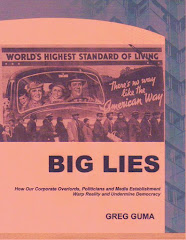 MAVERICK CHRONICLES: 1/28/11, PART TWO
MAVERICK CHRONICLES: 1/28/11, PART TWO
This is Maverick Media’s Rebel News Round Up,* broadcast live at approximately 11:30 a.m. Friday on WOMM (105.9-FM/LP – The Radiator) in Burlington.
In Part One: Goodbye Jack LaLanne, global unemployment, political prisoners – Lori Berenson and Bradley Manning, Oscar’s Top Ten, Vermont’s challenge to corporate “people,” Internet taxes, and the rumor of the week.
Live Stream: http://www.theradiator.org/drupal/webcam.html
Now for the state of the union – at least the president’s version of it. Obama started strong on Tuesday night, going for the heart by playing the Tucson card. He followed up his reference to the tragic Arizona shooting with a great rhetorical jujitsu move. He took a desperate desire to feel united – we’re “bound together as one people,” he proposed, and “we share common hopes and a common creed” – and he combined it with the idea that the country is special. He didn’t use the word exceptional, a favorite of the GOP these days. But he did say we’re “set apart as a nation” and returned to the idea later.
.
Then he went after the opposition. It was a brief attack, and subtle. “We will move forward together, or not at all,” he said. Cliché, but it’s also a way of saying, Hey GOP, get serious. We’re in this together. He called it “shared responsibility.” So, don’t screw up, guys. It was sort of a threat, but also a challenge.
.
From there Obama dove into his main argument, which is basically – things have changed. That makes sense, since promising change was how he got there. Here’s how he started: “You didn’t always need a degree, and your competition was pretty much limited to your neighbors. If you worked hard, chances are you’d have a job for life, with a decent paycheck, good benefits, and the occasional promotion.”
But the “rules” have changed, he said. Technology has changed, the world itself has changed – and, by the way, countries like India and China have discovered how to compete. He didn’t mention it, but most people suspect they’re cleaning our clocks.
And still he promised that “The future is ours to win….But to get there, we can’t just stand still.” Which led directly to the basic theme of the speech – we’re in a race, a race about “winning the future.” Fortunately, he has a three point program for winning: encouraging innovation, educating our kids, and rebuilding the country.
He linked innovation – “it’s how we make a living” – to the free enterprise system and Sputnik. The proposition is that we’re having a “Sputnik moment.” What’s that? Apparently a race into some new, uncharted territory. To win the innovation race, he called for government investment in biomedical research, information technology, and clean energy technology. Republicans, of course, say investment is just another word for spending, something they normally don’t like – unless it’s military. By the way, Obama also called nuclear power, coal, and natural gas clean energy sources. So, winning the future also involves some magical thinking
.
The second race – to educate our kids – is complicated. It goes on everywhere – in homes, communities and, obviously classrooms. And it involves raising standards, making college affordable for more people, and regaining an old title: highest proportion of college graduates in the world. In a strong move, Obama also related education to immigration, talking about working together on a tough issue. Here’s the best line: “let’s stop expelling talented, responsible young people who can staff our research labs, start new businesses, and further enrich this nation.” Practical and inspiring.
The third race – to rebuild America – was basically about infrastructure, a favorite word for politicians. Obama spoke specifically about high-speed rail and high speed wireless. Apparently winning this one involves increased speed. No surprise there.
But to win these three races some barriers need to be removed. One of them, he claimed, is the tax code. Here’s where it gets tricky. Obama argued that some businesses get away with murder using lawyers and loopholes, but the rest have to deal with what he called “the highest corporate tax rates in the world.” It was classic Clinton, a triangulation move designed to disarm the Republicans and persuade some of their base. He wants to get rid of loopholes, he said, but will use the savings to “level the playing field” and “lower the corporate tax rate for the first time in 25 years.”
He used the same tactic with health care, saying he wouldn’t bend on protecting the basics in health care reform but, at the same time, offered to work on fixing flaws like “an unnecessary bookkeeping burden on small businesses.”
These speeches usually have at least one specific proposal. In this case, it was Obama’s plan to “freeze annual domestic spending for the next five years.” This will include both things he likes – he mentioned community action programs – as well as the military. He was doing fine here until he tried to be funny. Sometimes humor works for Obama. But this attempt to be clever didn’t:
“Cutting the deficit by gutting our investments in innovation and education is like lightening an overloaded airplane by removing its engine. It may feel like you’re flying high at first, but it won’t take long before you’ll feel the impact.”
You could hear the crickets. Somebody should explain that plane crashes are a comedy killer.
He soon recovered, however, triangulating like a crazy man on the deficit. But once he did that, there was a bold pivot. Just a month after orchestrating a lame duck session compromise on taxes, he said, “we simply cannot afford a permanent extension of the tax cuts for the wealthiest 2% of Americans.” Then he challenged the GOP to “forge a principled compromise that gets the job done."
Getting things done will apparently also involve “reorganization,” another favorite fallback for politicians and bureaucrats. In Obama’s case the promise is to “merge, consolidate, and reorganize the federal government,” an idea he linked to the information age but sold with another joke:
“the Interior Department is in charge of salmon while they’re in fresh water, but the Commerce Department handles them in when they’re in saltwater. And I hear it gets even more complicated once they’re smoked.”
He got the laugh this time. At that point, about 45 minutes into the speech, Obama finally made it to relations with the rest of the world. He talked about “America’s moral example,” another mythical but very popular concept. This part of the speech requires some translation. For example:
“Look to Iraq, where nearly 100,000 of our brave men and women have left with their heads held high; where American combat patrols have ended; violence has come down; and a new government has been formed.”
In other words, we won.
“Our purpose is clear – by preventing the Taliban from reestablishing a stranglehold over the Afghan people, we will deny al Qaeda the safe-haven that served as a launching pad for 9/11.”
Translation: Forget about places like Yemen. They’re small and hard to find on a map.
“…we have sent a message from the Afghan border to the Arabian Peninsula to all parts of the globe: we will not relent, we will not waver, and we will defeat you.”
Translation: Hey, I can do Bush bravado as well as anyone.
“We have reset our relationship with Russia...”
You know, it’s like rebooting a PC.
“Recent events have shown us that what sets us apart must not just be our power – it must be the purpose behind it. In South Sudan – with our assistance – the people were finally able to vote for independence after years of war. Thousands lined up before dawn. People danced in the streets.”
Yes, we are special. Can you hear the music?
“let us be clear: the United States of America stands with the people of Tunisia, and supports the democratic aspirations of all people.”
Translation: I can also do Reagan. And then came the longest standing ovation of the evening. It followed this standard power play – the patriot card:
“We must never forget that the things we’ve struggled for, and fought for, live in the hearts of people everywhere. And we must always remember that the Americans who have borne the greatest burden in this struggle are the men and women who serve our country.”
Score! But then he spoiled it, at least for me, with this:
“Our troops come from every corner of this country – they are black, white, Latino, Asian and Native American. They are Christian and Hindu, Jewish and Muslim.”
What? Nothing for atheists. Then this:
“I call on all of our college campuses to open their doors to our military recruiters and the ROTC. It is time to leave behind the divisive battles of the past. It is time to move forward as one nation.”
Even Bernie Sanders stood up. But I couldn’t tell whether he was excited about the return of ROTC or the idea of getting beyond divisiveness. In either case, I’m worried. But the main point was this:
“…as contentious and frustrating and messy as our democracy can sometimes be, I know there isn’t a person here who would trade places with any other nation on Earth.”
Translation: We’re still number one. And very special.
Since it’s becoming harder to accept this notion on pure faith, he backed it up with the American dream – always a winning argument. In this case, he used it not only to sell his case but to achieve another goal – making House Speaker John Boehner cry. Here’s how he did it:
“That dream is why someone who began by sweeping the floors of his father’s Cincinnati bar can preside as Speaker of the House in the greatest nation on Earth.”
The waterworks opened. Mission accomplished.
We were in the wrap up now. Here he used a vignette, in this case about a small business guy named Brandon Fisher, who helped rescue the Chilean miners last year using something he called “Plan B,” a new type of drilling equipment. But the important thing was a catch phrase one employee provided. Obama, who is also Marketer-in-Chief after all, adopted it for the country:
“We do big things.”
About a decade ago, Michael Moore released a movie about downsizing called The Big One. The idea was that it might be a good new name for the country. Obama has taken the next step – giving the country a slogan: “We do big things.” Perfect. Those “things” may be violent, radical, wasteful, brilliant, selfish – whatever. But at least they’re big. He was giving the people what they want, a sense – however misguided – that we’re big and special and can never be stopped.
He ended with this:
“…our future is hopeful, our journey goes forward, and the state of our union is strong.”
Why? Because he says so. USA, big, fast, winning the race for the future. Sounds exciting.
It’s week 526, 3682 days since the country was taken hostage in a court-ordered coup. This is Greg Guma with the Rebel News Round Up for January 28, 2011 on WOMM-LP. Broadcasting from high atop the Radiator’s 50-storey skyscraper in beautiful downtown Burlington, here in the People’s Republic of Vermont.
* This is an edited transcript and does not include extemporaneous comments and last minute changes or additions.


































